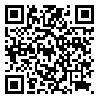BibTeX | RIS | EndNote | Medlars | ProCite | Reference Manager | RefWorks
Send citation to:
URL: http://jdisabilstud.org/article-1-2883-en.html
2- Assistant Professor, Department of Psychology, Babol Branch, Islamic Azad University, Babol, Iran
3- Assistant Professor, Department of Psychology Group, Payame Noor University, Tehran, Iran
Abstract
Background & Objective: Lack of interest and motivation for the study has never been caused by one factor, and as a result, there are many unknowns and problems in educational failure. One of these issues is the feeling of academic boredom and its causing factors. Educational boredom is an excitement and one of the crucial factors in disrupting the optimal learning process of students. This educational excitement is defined by cognitive, emotional, physiological, and motivational components as well as external indicators or manifestations experienced during educational activities such as class attending, studying, or doing homework. On the other hand, active participation in school is a multidimensional structure that has both cognitive (self–directed learning and using cognitive strategy) and emotional (sense of belonging to school and valuing of school education) dimensions and has positive educational and personality consequences for students and is an essential and worthwhile challenge as an aspect of adolescent growth. Students' participation in the teaching and learning process is a crucial step towards increasing the quality and achieving the goals of education. Therefore, the purpose of the current study was to present a structural model of relationships between active participation in school and educational boredom with the mediating role of competency perception in high school boys.
Methods: According to its purpose, this research is fundamental, and in terms of data collection, it is a correlational analysis employing structural equation modeling. The statistical population consisted of all ninth–grade male students in public schools in Babol City, Iran. The sample size was estimated as 300, according to the number of variables, the allocation of a coefficient of 25 for each variable (10 variables observed in the model), and the possibility of some incomplete questionnaires. They were selected by a two–stage clustering method. In the first stage, 10 schools were selected from 14 public schools in Babol. In the second stage, 12 classes were randomly selected from all twenty 25–student classes. To collect data, the Questionnaire of Active Participation in the School (Wang et al., 2011), the Educational Boredom Scale (Pekran et al., 2005), and the Competency Perception Questionnaire (Harter, 1985) were used. For data analysis, regression analysis and structural equation modeling were performed in SPSS18 and Amos23 software. The significance level was set at p<0.05.
Findings: The results showed that the variables of active participation in school have a direct and significant effect on educational boredom (β=–0.274, p=0.027), perception of competence on academic boredom (β=–0.587, p=0.042), and also the indirect path of the impact of active participation in school was verified with the mediating of the competency perception on boredom (β=–0.582, p=0.001). The model had a good fit according to the indices of GFI=0.994, CFI=0.990, and RMSEA=0.044.
Conclusion: Based on the research findings, active participation in school affects academic burnout through the mediation of competence perception. Therefore, it is suggested that students are encouraged to participate in school activities through teamwork, solving problems creatively, doing things, and achieving a common goal with cooperation. These activities can promote cognitive behavioral activity as the essential components of competence perception and reduce academic failure, boredom, and even truancy.
| Rights and permissions | |
 |
This work is licensed under a Creative Commons Attribution-NonCommercial 4.0 International License. |




